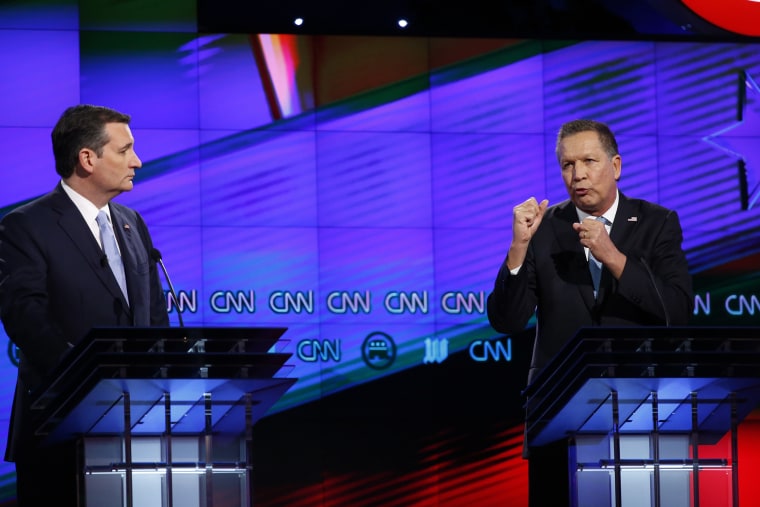The conventional wisdom has shifted more than once about Donald Trump's chances of locking up the Republican nomination before the party's convention, but as things stand, his odds aren't bad at all.
There are five primaries tomorrow, and Trump is well positioned in all of them, including a big lead in Pennsylvania, this week's largest prize. Next week is Indiana's primary, and two new polls show Trump ahead there, too. For good measure, the GOP frontrunner even has a sizable advantage in California, which has more delegates available than any other state.
The road ahead for Trump isn't easy, but if these polls are correct, and he wins by sufficient margins, it's hardly unrealistic to believe the New York developer will secure the necessary delegates by the time voting ends in early June. If Ted Cruz and John Kasich are going to prevent that outcome, they're going to have to do something.
So, they're doing something. NBC News reported:
The campaigns of Ted Cruz and John Kasich announced an agreement Sunday night to coordinate their efforts to prevent Donald Trump from winning the GOP's presidential nomination before the Republican National Convention. "To ensure that we nominate a Republican who can unify the Republican Party and win in November, our campaign will focus its time and resources in Indiana and in turn clear the path for Gov. Kasich to compete in Oregon and New Mexico," Cruz's campaign manager Jeff Roe said in a statement late Sunday. The Kasich campaign sent its own statement minutes later.
For his part, Trump accused his rivals of "colluding" against him, which seems fair, given that his rivals really are "colluding" against him.
The strategy is pretty straightforward: if the anti-Trump vote is diluted in a three-man race, Trump's opponents have an incentive to make it easier for rivals to consolidate their support. Cruz is stronger in Indiana, so Kasich will pull back there, and Kasich is stronger in Oregon and New Mexico, so Cruz will give up competing in these states.
Since both Cruz and Kasich are mathematically eliminated from reaching the 1,237-delegate threshold before the convention anyway, both figure it's more important to prevent Trump's wins than compete in every state.
This same idea has been espoused by Trump detractors for over a month, but Cruz has resisted, and waiting until late April to give it a try may be too late.
The timing, however, isn't the only reason to question the efficacy of the plan. First and foremost, serious presidential contenders aren't supposed to forfeit key states, on purpose, because they're engaged in some brazen scheme.
For that matter, when Team Cruz effectively tells supporters to vote for someone else, some of them may very well end up backing Trump, not Kasich, defeating the purpose of the 11th-hour alliance.
Finally, if the plan is executed to perfection, and Trump is denied the nomination, the New Yorker will question the legitimacy of the process, and the Cruz-Kasich partnership will bolster Trump's case.
Still, the anti-Trump candidates may feel as if they have few other options, and in light of the New York primary results and the newest polls, Cruz and Kasich are probably correct.
Postscript: Though gambits like these are often talked about, they're rarely tried in practice. The last time we saw competing candidates coordinate along these lines? The race for the Democratic nomination in 1976.
